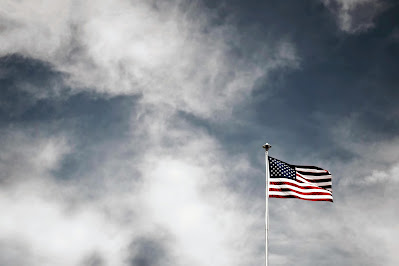Given that it's September I don't know what we're waking up to today, November 6th. It's possible we don't know who won, that votes are still being counted or that the outcome is being contested or questioned. But maybe the winner is clear and a concession speech has been offered.
Regardless, I think it's safe to assume that the nation is feeling pretty fragile this morning, either anxiously awaiting a final verdict or half the country feeling intense dismay. Which brings me back to my Bushnell talk.
I framed my talk yesterday around two sermons I gave at my church, Freedom Fellowship, in 2016 and 2020. Freedom meets on Wednesdays, which means, like today, we always gather the day after elections. On both of those Wednesdays in 2016 and 2020 I was the one, just because of luck, scheduled to give the lesson. In 2016, after Trump had defeated Clinton, all my Democrat friends were dismayed and shell-shocked. Seeing this, I delivered a sermon entitled "How to Lose an Election." Four years later, my Republican friends were dismayed when Trump lost to Biden. And so, I delivered the exact same sermon for second time: "How to Lose an Election."
I told those stories at Bushnell to set up a conversation about how to deal with anxiety during a polarized election. Basically, as Christians, we need to learn how to lose elections. And while I don't know who won or lost as I write this, some of us are feeling anger, fear, and dismay today.
So, how do you lose an election?
In my Bushnell talk, one of the points I made comes from Jeremiah 29. Some of the Israelites have returned home from their Babylonian exile. But many remain behind in Babylon. These write to the prophet Jeremiah asking if they should come home. But Jeremiah writes back to say, no, you should stay in Babylon. And not just stay, to multiply and thrive:
Thus says the Lord of hosts, the God of Israel, to all the exiles whom I have sent into exile from Jerusalem to Babylon: Build houses and live in them; plant gardens and eat what they produce. Take wives and have sons and daughters; take wives for your sons, and give your daughters in marriage, that they may bear sons and daughters; multiply there, and do not decrease. But seek the welfare of the city where I have sent you into exile, and pray to the Lord on its behalf, for in its welfare you will find your welfare.
Seek the welfare of the city, for it its welfare you will find your welfare. Crucially, the Israelites remain in Babylon as a marginalized, disenfranchised, exilic people. They do not control Babylon, nor will they ever control Babylon. Political power is not in their hands. And yet, there is work to do! Seek the welfare of the city.
And let's be clear on this point, this is Babylon we are talking about. Babylon, the epitome of wickedness, oppression, injustice, violence, and evil in Biblical history and imagination. The point here is that the People of God thrive in places of political marginalization. The People of God thrive in Babylon. So there's no excuse for us not to thrive, even if we lost the election. No matter the outcome today, there is good, creative, generative, and beautiful work to do.
How do you lose an election? It's simple.
You plant gardens in Babylon.


